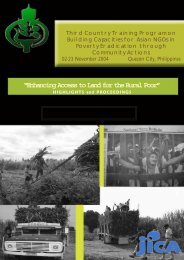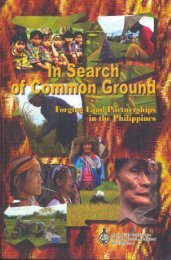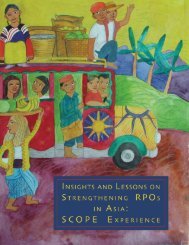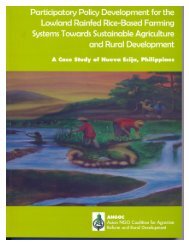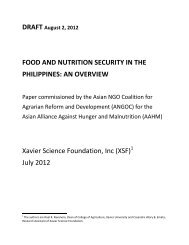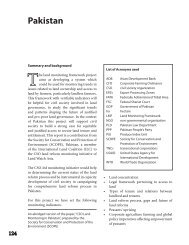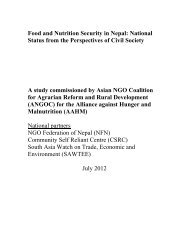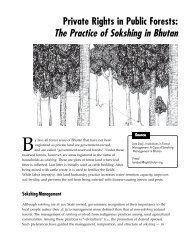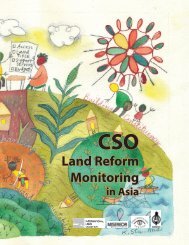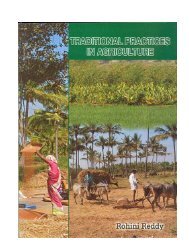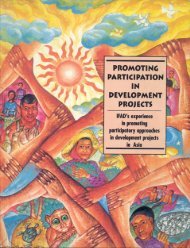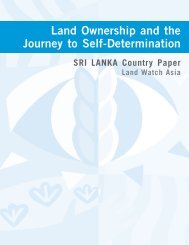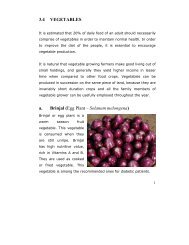Securing the Right to Land FULL - ANGOC
Securing the Right to Land FULL - ANGOC
Securing the Right to Land FULL - ANGOC
Create successful ePaper yourself
Turn your PDF publications into a flip-book with our unique Google optimized e-Paper software.
Generate public awareness of land rights as an important<br />
fac<strong>to</strong>r in ensuring social justice, eliminating poverty, and<br />
promoting progress;<br />
Conduct powerful agitation programs from <strong>the</strong> community<br />
<strong>to</strong> <strong>the</strong> national level in order <strong>to</strong> abolish discrimination in<br />
terms of class, caste, gender, etc.;<br />
Participate in all kinds of non-violent agitation programs<br />
related <strong>to</strong> <strong>the</strong> formation of a democratic government and<br />
<strong>the</strong> establishment of human rights and social justice; and<br />
Manage land in a productive and systematic manner.<br />
The movement has adopted a democratic, participa<strong>to</strong>ry approach,<br />
and adheres <strong>to</strong> transparent and responsive processes at<br />
all levels of decision-making and organizational operations. It<br />
strives <strong>to</strong>ward democratic leadership and building consensus in<br />
making decisions. It is not aligned <strong>to</strong> any political party.<br />
The State/Government<br />
After res<strong>to</strong>ration of democracy in 1990, <strong>the</strong> Parliament has<br />
been a little more active and has taken up <strong>the</strong> issues of poor<br />
tillers and peasants. For example, <strong>the</strong> Parliament declared <strong>the</strong><br />
abolition of <strong>the</strong> bonded labor system in Nepal in July 2002. They<br />
have called attention <strong>to</strong> <strong>the</strong> continued practice of bonded labor,<br />
particularly Haliya, and a number of specific cases of land displacement<br />
resulting from development projects.<br />
There are two main government agencies instrumental in directing<br />
and guiding land access and tenure issues in Nepal.<br />
The National Planning Commission (NPC) has overall responsibility<br />
for setting up development policy and strategies. The<br />
<strong>Land</strong> Reform and Management Ministry implements <strong>the</strong> agreed<br />
policies and strategies on <strong>the</strong> ground. NPC is <strong>the</strong> advisory body<br />
for formulating development plans and policies of <strong>the</strong> country<br />
ASSERTING FREEDOM FROM CENTRAL CONTROL<br />
123<br />
under <strong>the</strong> directives of <strong>the</strong> National Development Council. It<br />
explores and allocates resources for economic development<br />
and works as a central agency for <strong>the</strong> moni<strong>to</strong>ring and evaluation<br />
of development plans, policies and programs and facilitates<br />
<strong>the</strong>ir implementation. Moreover, it provides a platform<br />
for <strong>the</strong> exchange of ideas, discussion and consultation pertaining<br />
<strong>to</strong> <strong>the</strong> economic development of <strong>the</strong> country. The NPC<br />
serves as an institution for analyzing and finding solutions <strong>to</strong><br />
<strong>the</strong> problems of civil society and NGOs, and <strong>the</strong> private sec<strong>to</strong>r<br />
in <strong>the</strong> country.<br />
The Supreme Court and <strong>the</strong> lower courts rule on petitions filed<br />
by <strong>the</strong> people. So far, <strong>the</strong> Supreme Court has issued two major<br />
rulings on <strong>the</strong> rehabilitation of former bonded laborers, including<br />
Haliyas, and on directing government <strong>to</strong> pass laws <strong>to</strong> protect<br />
<strong>the</strong> rights of such victims.<br />
Political Parties<br />
All <strong>the</strong> eight major political parties have acknowledged that agri-<br />
culture is <strong>the</strong> backbone of <strong>the</strong> Nepalese economy, and proposed<br />
multi-dimensional programs <strong>to</strong> develop it. Based on <strong>the</strong>ir declarations,<br />
<strong>the</strong> political parties—whe<strong>the</strong>r rightist, leftist, or centrist<br />
seem <strong>to</strong> share <strong>the</strong> opinion that development of <strong>the</strong> agriculture<br />
sec<strong>to</strong>r is possible if all <strong>the</strong> issues related <strong>to</strong> it, including tenancy<br />
rights, are addressed simultaneously and with equal vigor.<br />
Since 1990, three parliamentary elections (1991, 1996, and<br />
1999) have been held in Nepal. In <strong>the</strong>ir elec<strong>to</strong>ral manifes<strong>to</strong>s,<br />
<strong>the</strong> parties have all raised <strong>the</strong> issues of land management, tenancy<br />
and agriculture. Most of <strong>the</strong>m appear <strong>to</strong> be sympa<strong>the</strong>tic <strong>to</strong><br />
<strong>the</strong> concerns of squatters, landless peasants, freed bonded laborers,<br />
indigenous/disadvantaged people, tenants and o<strong>the</strong>r<br />
similar groups of landless people. They are also worried about<br />
accelerated land fragmentation and have debated issues, such<br />
as <strong>the</strong> commercialization or privatization of agriculture, and<br />
proposed ‘revolutionary’ or ‘scientific’ land reforms.<br />
The following are <strong>the</strong> common points in <strong>the</strong> elec<strong>to</strong>ral manifes<strong>to</strong>s<br />
of <strong>the</strong> eight major political parties:<br />
<strong>Land</strong> reform is a priority concern.<br />
<strong>Land</strong> reform is a vital aspect of overall agricultural development,<br />
and not only in regard <strong>to</strong> <strong>the</strong> management of land<br />
ownership.<br />
Dual ownership of land should be abolished.<br />
The establishment of a fertilizer fac<strong>to</strong>ry is an urgent goal.<br />
ASIAN NGO COALITION FOR AGRARIAN REFORM AND RURAL DEVELOPMENT



